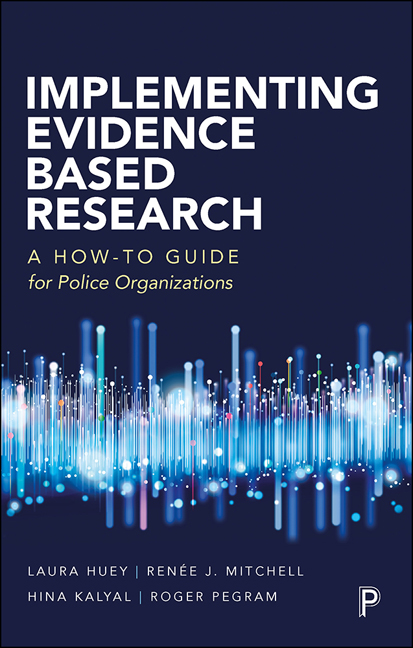Book contents
- Frontmatter
- Contents
- List of tables and figures
- Acknowledgments
- Introduction
- 1 Implementing evidence-based policing
- 2 Situating evidence-based policing
- 3 Understanding research
- 4 The individual approach
- 5 The smaller agency
- 6 The mid-sized agency
- 7 The larger agency
- 8 Generating sustainability
- 9 Resources for evidence-based practices
- Endnotes
- References
- Index
3 - Understanding research
Published online by Cambridge University Press: 05 January 2022
- Frontmatter
- Contents
- List of tables and figures
- Acknowledgments
- Introduction
- 1 Implementing evidence-based policing
- 2 Situating evidence-based policing
- 3 Understanding research
- 4 The individual approach
- 5 The smaller agency
- 6 The mid-sized agency
- 7 The larger agency
- 8 Generating sustainability
- 9 Resources for evidence-based practices
- Endnotes
- References
- Index
Summary
Although we recognize that ‘research methods’ is often the least favourite topic for many people, successfully engaging with the ‘triple-T’ strategy – particularly as it relates to the testing component – requires a degree of knowledge on research methods and research design. In recognizing that engaging in research is not something that many police practitioners do as part of their regular duties, the purpose of this chapter is to provide an overview of research fundamentals.
To begin, this chapter will provide a broad overview of both quantitative and qualitative methods. While doing so, practical police-related examples will be provided to articulate how some of the elements discussed throughout can be employed in practice to answer research questions that may be pertinent within a policing context. Before wrapping up, we will also discuss two important components that are used to understand the body and quality of research: evidence hierarchies and evidence syntheses. As will be outlined later on, evidence hierarchies and syntheses not only help us in determining whether a particular police practice, policy, or strategy is evidence-based or not, but they also remind us to be cautious about what we consider as ‘evidence’.
A note of caution: what this chapter will not do is explain how to employ what is discussed. Doing so would require significant elaboration on research-related components that simply cannot be described in full within a single chapter. Therefore, this chapter should be considered as a preliminary ‘starting point’ for basic information related to quantitative and qualitative methods.
Research questions and hypotheses
One of the most crucially important components of research is formulating a clear idea of what it is that you intend to study. A research question is anything that you seek to answer through your research, and the reason as to why establishing this component is so crucial is because the type of question you pose will impact how you approach your research from the beginning (Hesse-Biber and Leavy, 2011; White, 2017). For example, questions that are related to numbers – such as, ‘how much has violent crime gone down on Main Street relative to similar areas?’
- Type
- Chapter
- Information
- Implementing Evidence Based ResearchA How-to Guide for Police Organizations, pp. 43 - 60Publisher: Bristol University PressPrint publication year: 2021



